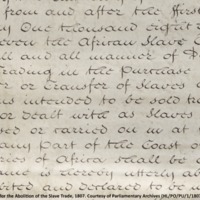
Heartbeat Riddim Chant
The dance-theatre production Heartbeat Riddim Chant was based on the horrors of the transatlantic slave trade. The production premiered at the West Yorkshire Playhouse in Leeds in July 2007, and mixed dance, live music and voice, including traditional Caribbean folk dancing blended with contemporary reggae. The show was choreographed by David Hamilton, and featured dancers from Regeyshun Dance and members of the community dance group Back Bone. There were also performances from youth dance groups and young voices from across Leeds, including LS7 Result, Northern School of Contemporary Dance, Gee4orce and Leeds Young Authors.
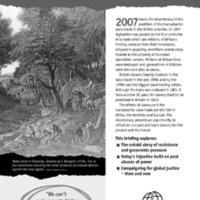
200 Years On: The legacies of enslavement and abolition
The World Development Movement seeks to increase awareness of political views in regards to world economic and social development. The organisation published a briefing in 2007 to mark the bicentenary, exploring the stories of grassroots pressure and the historic and modern campaigns for global justice. In collaboration with the University of Leeds, the World Development Movement also organised two public events looking to explore the lessons to be learned from the struggle to end the slave trade and examining contemporary campaigns in Africa and beyond for global social justice. Speakers included the Kenyan writer and academic Ngugi wa Thiong'o.
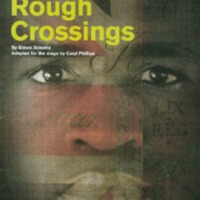
Rough Crossings
Historian Simon Schama's true story of a plantation slave (Thomas Peters) and a British naval officer (John Clarkson) and their search for freedom at the time of the American War of Independence. Schama's account was adapted for the stage by Caryl Phillips, directed by Rupert Goold and produced by the Headlong Theatre Company. It explores ideas of racial identity, home and freedom, as former slaves who fought for the British army are led across the Atlantic to the newly-created province of Sierra Leone. The play toured West Yorkshire Playhouse, Birmingham Repertory Theatre, Liverpool Everyman and Lyric Hammersmith.
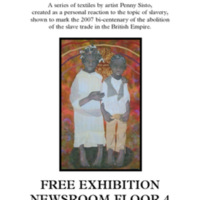
Threads of Strength and Fortitude
Threads of Strength and Fortitude was an exhibition of a series of textiles by artist Penny Sisto, created as a personal response to the bicentenary. The quilts were shipped over from New Albany, Indiana, and exhibited at the Royal Armouries in Leeds. Eight quilts explored the theme of slavery through depictions of servitude, emancipation and the flight to freedom. Pieces on show include 'Slave Ship 1,' which depicts eight enslaved Africans chained by their necks on a slave ship. Another quilt, 'Ran Away', showed a farmer leading Underground Railroad travellers by lantern light. The exhibition was accompanied by an interactive DVD, 'Ordinary People, Extraordinary Courage: Men and Women of the Underground Railroad in the Indiana and Kentucky Borderland'. There was also a series of events, including guest lectures and workshops on the subject of the abolition of slavery aimed at school and community groups. Art-based workshops explored the themes of peaceful resistance.
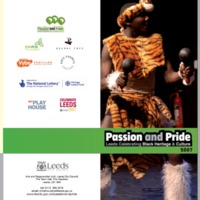
Passion and Pride
Passion and Pride was a creative partnership project bringing together Leeds City Council's Arts and Regeneration Unit with twelve local community organisations. Building on momentum established through Black History Month, the performances, exhibitions and workshops celebrated black heritage and culture in Leeds during 2007. Highlights included the performance of 'Grandma's Story' at West Yorkshire Playhouse by the 10-2 Club, a short play about the real life experience of living through slavery.
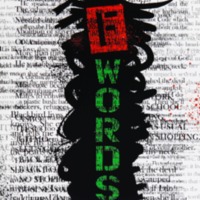
FWords
FWords was a creative response of eight Yorkshire writers and artists to the commemoration of the Abolition Act, in a project led by Peepal Tree Press in Leeds. Focusing on the many variations of the theme of 'Freedom', Fwords was created to raise the profile of Yorkshire's rich heritage of talented artists, descendants of those who migrated, forcefully and otherwise from Africa and beyond. The work of six writers was illustrated with work from two visual artists, and with a foreword from Caryl Phillips. The project was supported by printed materials, broadcasts, digital and dedicated web pages.
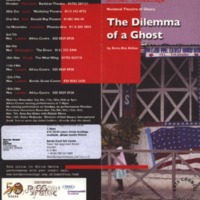
The Dilemma of a Ghost
Written by Ghanaian playwright Ama Ata Aidoo, The Dilemma of a Ghost deals with colliding cultures in 21st century Africa. An African-American woman accompanies her Ghanaian husband as he returns home, but the couple are haunted by ghosts of the inheritance of the slave trade. A collaboration between London theatre company Border Crossings and the National Theatre of Ghana, the production used music and dance to celebrate 50 years of Ghana’s independence and 200 years since the abolition of the transatlantic slave trade. The play was performed in Birmingham, Hull, Leeds, Leicester, London, Plymouth and Slough. The production was was accompanied by a new book from Border Crossings, working in collaboration with Anti-Slavery International. ‘Theatre and Slavery: Ghosts at the Crossroads’ explored the ways in which world theatre responds to key issues in modern society and politics, including the issue of contemporary slavery.
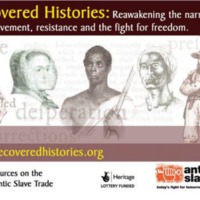
Recovered Histories
In the Recovered Histories online resource, Anti-Slavery International digitised and made accessible for the first time a collection of over 800 pamphlets dating from the 18th and 19th centuries relating to the transatlantic slave trade. The resource captured the narratives of the enslaved, the enslavers, slave ship surgeons, abolitionists, parliamentarians, clergy, planters and rebels. An accompanying touring historical exhibition and an education pack featured testimonies and pictures from Africans subjected to slavery, those participating in the enslavement and those who fought against it. An outreach and resources programme included a series of free regional seminars in April and May 2008, which encouraged dialogue about the transatlantic slave trade and its legacies by bringing together a wide range of groups and organisations who worked on these issues. The workshops were held in Bristol, Edinburgh, Leeds, London and Manchester. A series of short stories were published, inspired by the Recovered Histories resource.
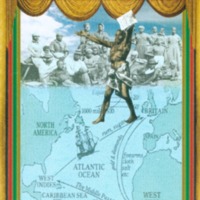
Leeds Bicentenary Transformation Project
This collaborative community initiative celebrated African and Caribbean culture in Leeds, with a focus on commemorating the Abolition Act by 'highlighting African achievement, liberation and aspirations'. New exhibitions, publications and resources were produced and over 100 bicentenary events organised under different themes: Education and Museums; Arts and Carnival Culture; Churches and Abolition; Legacy; Black History and Community Development; Media and Communications. Highlights included the photographic exhibition and pamphlet 'From Abolition to Commonwealth', which remembered indentured labour in Africa and the Caribbean after 1807, and the 40th anniversary of Leeds West Indian Carnival, with themes that highlighted heritage, liberation, respect and freedom. Project outputs included an education pack, black history classes, concerts, church services, lectures and performances.